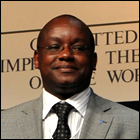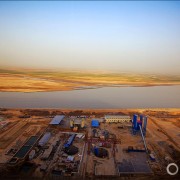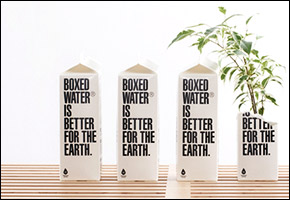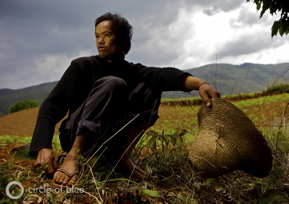David Kuria: Sanitation and Toilet Entrepreneur
Welcome to Circle of Blue Radio’s Series 5 in 15, where we’re asking global thought leaders 5 questions in 15 minutes, more or less. These are experts working in journalism, science, communication design, and water. I’m J. Carl Ganter. Today’s program is underwritten by Traverse Internet Law, tech savvy lawyers, representing internet and technology companies.
In the sub-Saharan region, 80 percent of recorded illnesses are water-born diseases, and more than two-thirds of these people don’t have access to basic sanitation. While access to safe drinking water is gaining importance in the political arena, it’s still hard to talk about restrooms and toilets, but today I’m speaking with a man who really does know toilets. David Kuria is founder of EcoTact. It’s an organization based in Nairobi that’s really transforming sanitation systems in Kenya and the greater sub-Saharan region. EcoTact’s campaign breaks down the stereotypes about sanitation. It’s also created a sustainable model for the Ikotoilet, a community hub of stores and services all built around a public toilet.
David, tell me about how water-born diseases and basic sanitation are related, and what kinds of transformations need to be made in health and sanitation?
…the first thing you see, beautiful thing, is a toilet. When you come to the city of Nairobi, you’ll be shocked. And the next thing you’ll be asking is what is this? It’s a public toilet. We are putting toilet monuments just to try and bring back the importance to our people of public convenience and public toilets.
We are trying to look at social transformation, economic transformation, and to some extent political transformation as far as sanitation is concerned. I think this is quite a distinct situation from the West, because from the word go, when we are talking about sanitation, back home we don’t talk about it. It’s a less topical subject that, at homes, we don’t talk about toilets at homes, we don’t talk about toilets at school, and even at the political level. When you look at the close spectrum, we are moving ahead very well in addressing the water situation, but nobody wants to be associated with sanitation. It’s a taboo in African culture. To us, what we are trying to say is, “How do we break these cultural barriers, economic barriers and political barriers to be able to accelerate sanitation access to our people?” Again, more than half of the people across the region have no sanitation. They’re either using open defecation, even in cities, or what we are calling in Nairobi, The Flying Toilet, just using the polythene bags and throwing them away. It’s really the key concern of lack of access, but also the behavior transformation that’s associated with improving dignity, improving public health of our people.
Sanitation is not something that’s openly discussed in sub-Saharan culture or really anywhere, so how are you working to get beyond the social taboo that restrooms and toilets have in the region and really anywhere?
What we are doing in my company is an initiative we launched two years ago called the Ikotoilet, which is derived from ecological systems. Now the idea of Ikotoilet again goes beyond the toilet. How do you break those cultural barriers of sanitation or toilets that we cannot talk about? We have gone beyond that, what we are calling thinking beyond the toilet, by putting up one aspect of sustainability, and that’s what we are calling the toilet mall, where you can go to the toilet for more than the pee and poo function, you can have your shoe polished, you can transfer money ATM, we have a system in the toilet, you can buy your soft drink, there’s a fresh cold drink, and trying to lead a transformation in the social thinking associated with a toilet. That is critical. Now the other aspect is how do you transform our behavior aspect of this?
We have engaged several celebrities in the country, including the beauty pageant, to talk about toilets. Everybody sees the beauty pageant. There are religious leaders going to the toilet and talking about it in public. Now we have been able to engage our political heads up to the very high level, including the Vice President, including the Prime Minister and the Deputy Prime Minister in Kenya.
We have engaged several celebrities in the country, including the beauty pageant, to talk about toilets. Everybody sees the beauty pageant. There are religious leaders going to the toilet and talking about it in public. Now we have been able to engage our political heads up to the very high level, including the Vice President, including the Prime Minister and the Deputy Prime Minister in Kenya, for them to come and visit the toilet, and the public is like, “How can they visit a public toilet?” Really, it’s purely trying to reinforce the importance of sanitation within the country. Apart from having the toilet mall, each mall is being served by ten young people, boys and girls. Again, it’s a pull of employment creation. This is providing leading number of young people engaged, some in shoe shining, others cleaning the facility. So within one facility of 50 square meters, we are having ten young people fully engaged into really viable employment opportunity. It’s really that transformation where we are trying to pull people. The other key aspect is again, in our tradition, most across Africa, is that you don’t see a toilet when you go there. It’s something hidden. Nobody needs to know you are going to a toilet. Now we have brought that to a front. For us to be able to address sanitation, we need to bring sanitation on the fore, and we have done that even at schools, so that as you go to the school, the most first thing you see, beautiful thing, is a toilet. When you come to the city of Nairobi, you’ll be shocked. And the next thing you’ll be asking is what is this? It’s a public toilet. We are putting toilet monuments just to try and bring back the importance to our people of public convenience and public toilets. Really, those are some of the transformations that we are undertaking across the country.
Some might find some wry humor here, but can you give us a few examples of responses you’ve been getting and how are people reacting to the idea of publicizing the private space of the restroom?
The first time when we launched it last year, it came from the media. When the Catholic Bishop… you know the blessing when they normally bless their facilities… he was blessing the toilet, and everybody in the media was landing, “Oh, you go there, there’s holy shit.” They were talking about holy shit. That’s really creating humor, but again the message gets passsed. Very interesting to see the beauty pageant, Miss Kenya, visiting the public toilet, and everybody’s like, “Oh, what is she doing?” To me, it’s really incredible when one of my workers, because again even been getting employees in the initial start was very difficult, but one of the workers when the Vice President visited in the toilet and he greeted the girl and talked to the girl, it was unbelievable. The girl had to tell the whole story in her house and family, “You know, I met the Vice President. Where else would you meet a Vice President? In the loo, yeah?”
When the Catholic Bishop… you know the blessing when they normally bless their facilities… he was blessing the toilet, and everybody in the media was landing, “Oh, you go there, there’s holy shit.” They were talking about holy shit. That’s really creating humor, but again the message gets passed.
She became very open, and she wanted to be identified that I work for Ikotoilet, and they have (a) uniform, and she’s comfortable in wearing it at home, “You know, I work with Ikotoilet.” She has a photo of the Vice President in the toilet talking to her. To me, it’s that excitement, for us to break the barrier associated with toilet and be able to solve really the very many casualties that are dying from water-born diseases. It really brings out, again to us, it’s that debate that needs to come out. We need to engage and really bring out in the media, bring out on a political level, where we are able to engage and looking for solutions. To me, I think, one of the critical things when I was starting this initiative, and really made several inquiries, I’m an architect by profession, was that don’t dare put soft drink in a toilet. Nobody in Kenya and outside that will be able to buy that. Today, you go to the Ikotoilets in the city, and people are queueing over the lunch hour to grab a Coke and some snack in the toilet. To me, really a transformation within less than a year, that’s really unbelievable that all of us urban people are now queuing in the toilet. It has also become like now a point of really a signature in terms of location. You’ll find people talking about can we meet at Ikotoilet on that street. The most visible thing around the street.
So David, tell me how education plays into all of this and how are the governments participating?
We have now started the initiative, what we are calling the Ikotoilet for Schools, again trying to transform, and we have beautiful toilets in our schools that kids want to use, want to be associated with. When you go to the school, and that’s the most beautiful thing in a school, it’s the school signature. For you to be, “Wow, in our school, we have the Ikotoilet.” To me, it’s most of these problems, especially social problems, can be addressed by purely some of social transformation, missions, and social marketing, where we are telling people let’s make sanitation an accepted subject, let’s talk about it. Again, like some ten years back about HIV-AIDS, nobody in Africa wanted to talk about it. Today, now, people have opened up and are able to talk about it and solve the problem. Now sanitation, despite killing more people than HIV-AIDS and polio combined in Africa, nobody wanted to talk about it because people think,
Nobody wants to talk about that subject. We need to open up the debate; we need to put it on the table and for us to get solutions.
“Oh, it’s about shit.” And nobody wants to talk about that subject. We need to open up the debate; we need to put it on the table and for us to get solutions. If you look at our government of the Sahara Region, the financial and budget allocation for sanitation, it’s not fair, and we need to address it at that high level. We need to see governments allocating sanitation budgets equivalent to water budgets. You put sanitation, and you put installation on water so that we have save water and sanitation as a combined piece. That’s when we can now talk about hygiene promotion in earnest.
How many Ikotoilet installations do you have in Kenya right now?
We have now finalized 40 facilities across the country, and we are currently serving approximately 30,000 people everyday. We are hoping by June next year, we should be able to have at least 100 facility installations across the country and also in Zanzibar, in Tanzania, and targeting countries to serve 100,000 people by June next year everyday.
That’s really incredible. So, what about taking this beyond Kenya, perhaps as a sustainable model?
What I see is that to me it’s really an applicable model. When we started in the city of Nairobi, it was more for the piloting, including with the government. It was like, “Are you sure this is something?” Today we are getting requests across municipalities in Kenya and now in Tanzania, Arusha municipality, Dar Es Salaam and now Zanzibar. To us, it is that people can now see a solution, that not only an investment solution, but a potential business solution and implementation, and also the potential for recovery within less than five years. To me, the investment is heavy because each Ikotoilet is costing about $20,000, but we are able to recover that within three to five years. Really, that’s a major achievement, if we can be able to recover that and re-invest in sanitation. We are hoping that that could be a potential solution in sub-Saharan Africa.
So what’s next for you, what’s next for your campaign now that you’ve entered the social and media arena, where do you plan to take your marketing strategy for the Ikotoilet?
It’s quite interesting. When I started the model two years back, because to me I was looking at the social transformation and sustainable aspect, and I thought in African context, sanitation or the issue of the toilet is the most difficult part. I said, why don’t I give it a shot, try and see how far we can be able to revolutionize this. Now the same approach, the same modeling, can be done to other social services, including unemployment in Kenya and really the region, the water crisis, and really market approach in agriculture and other things. To me, it’s really a model that can be evolved by, and really we can borrow from the distribution of the cell phone. Within five years, you go to the poorest slums in the city of Nairobi, and you’ll get men and women with cell phones. It’s expensive, but it’s a status thing. They want to be associated with it. It’s a dignative thing. We need to package sanitation and some of our basic social services to that level of marketing and ensure that everybody wants to be associated with that. It’s clean. It’s a dignity issue, and really it’s satisfying. Everybody’s talking about it.
Thank you, David. We’ve been speaking with David Kuria, founder of Ecotact and the Ikotoilet. To learn more about Ecotact and other projects, be sure to tune in to Circle of Blue online at CircleofBlue.org. Our theme is composed by Nadev Kahn, and Circle of Blue Radio is underwritten by Traverse Legal, PLC, internet attorneys specializing in trademark infringement litigation, copyright infringement litigation, patent litigation and patent prosecution. Join us gain for Circle of Blue Radio’s 5 in 15. I’m J. Carl Ganter.
is a Washington, D.C–based correspondent for Circle of Blue. He graduated from DePauw University as a Media Fellow with a B.A. in Conflict Studies. He co-writes The Stream, a daily summary of global water news.











Hello David,
I read about your EcoTact toilet projects in Nairobi and was very impressed. I have been requested to do something similar in my country (Liberia) I would like to email or call you to get some information related to your toilet project. Please send me your contact information so that we can discuss. Thanks a lot.
Regards,
Ernest.